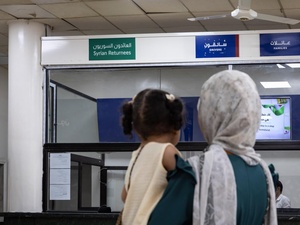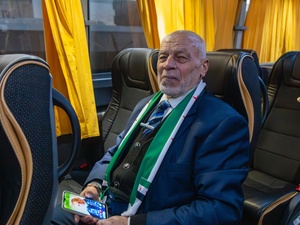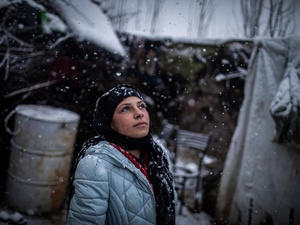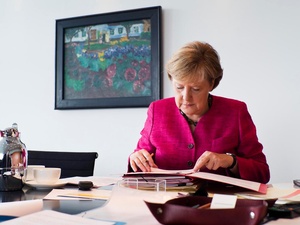Learning to live again

Learning to live again
The crisis in Syria has ripped millions of families from their homes, their country and each other. Today, there are over 3 million Syrian refugees, with around 100,000 more added each month. Many have been forced to flee with little more than the clothes on their backs.
For Syria's displaced youth, who are often described as a lost generation, education has become a pipe dream. Public schools in host countries often struggle to accommodate the teeming refugee population, and although UNHCR and partner agencies work with local NGOs and governments to introduce programs such as evening and catch-up classes, the gap remains enormous. According to UNICEF, two-thirds of Syrian refugee children across the region are out of school.
"Each day out of Syria gets both easier and harder," says Hany, a gifted 21-year-old Syrian refugee living in Lebanon's Bekaa Valley. "Easier because you get used to living outside of Syria… but harder because you don't want to accept that."
Meet Syria's lost generation, whose dreams of education, just like their home, lie in ruins.

Back in Syria, Mostafa was a promising student, but fled after losing his mother and brother. Now in Lebanon, he volunteers at a school and hopes to continue his education.
Mostafa, 23
When shrapnel tore through Mostafa's home in Homs two years ago, he couldn't move for minutes, he says, maybe even hours. Time froze. Before even opening his eyes, he knew life would never be the same.
"I didn't want to see what I knew had happened," he recalls, anxiously.
When he finally opened his eyes, he saw what can never be unseen: the bodies of his mother and young brother lying lifeless, almost unrecognizable.
With barely any time to arrange a proper burial, Mostafa, his father and younger brother fled to Lebanon. Today, Mostafa works odd jobs, in an effort to continue his education, but although he was once a promising engineering student at Aleppo University, he has found that most programs at Lebanese universities are simply too expensive.
Mostafa saw what can never be unseen: the bodies of his mother and young brother lying lifeless, almost unrecognizable.
His father, still enveloped in grief, is barely able to get up some mornings and Mostafa has become a second father to his younger brother. To "make better use" of his time, Mostafa also volunteers at a school run by Jusoor, a non-governmental organization started by Syrian expatriates to educate the country's displaced youth. He sings and dances with the children, who follow him around with smiles stretching up to their ears.
Spending time with the children has been a kind of therapy for Mostafa, exposing him to a world outside his own of unbearable loss.
"These are my people," he says, walking into a room of young Syrian refugees, all huddled in a circle, vibrating with energy even before Mostafa picks up his drum.
"When I look into their eyes, I see my pain," he says, grabbing the hand of a five-year-old boy who lost his father in Syria last year. "But I also see my country."
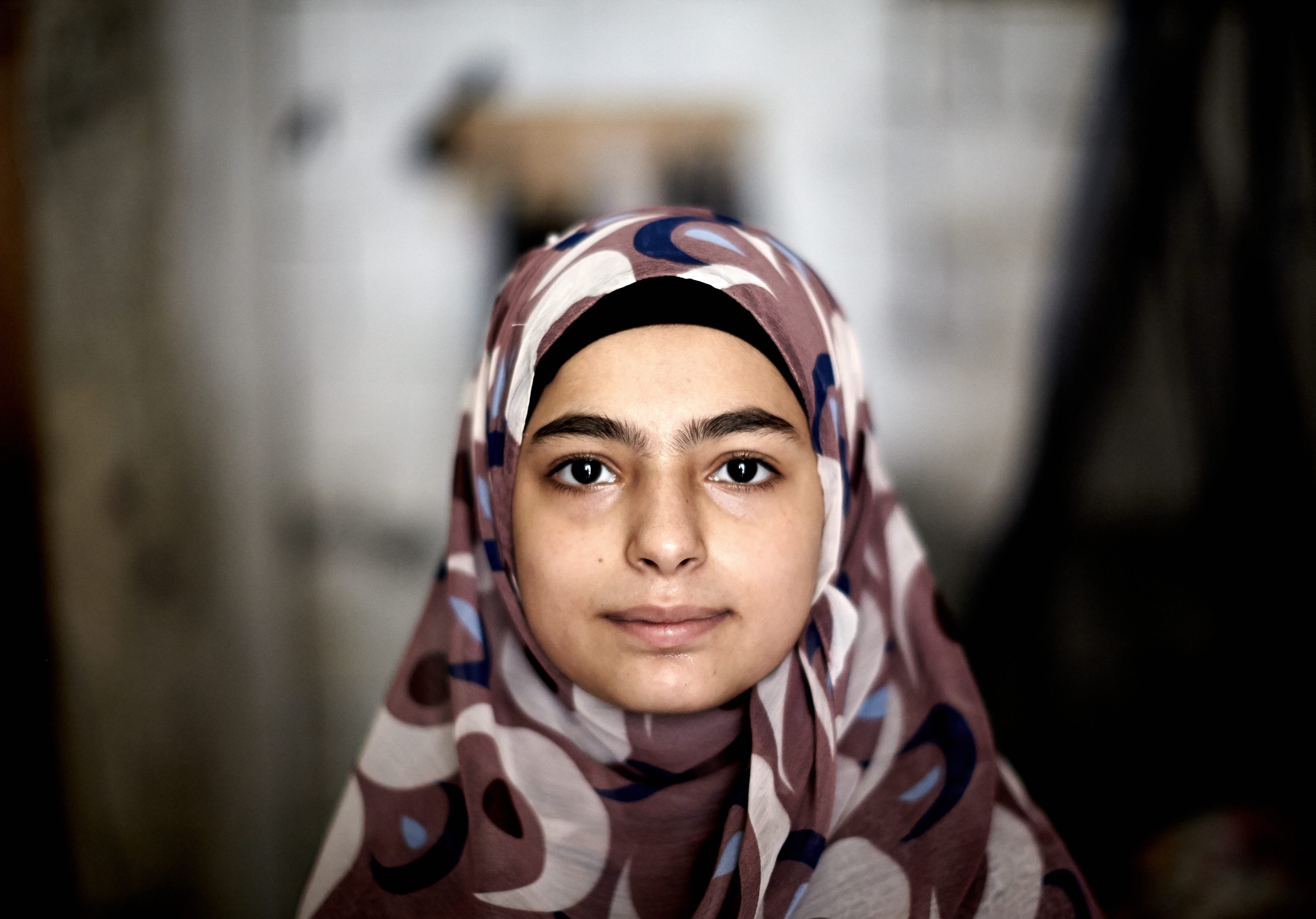
Bayan fled Aleppo with her family two years ago and has struggled to adjust to life in Lebanon. She says she experiences harassment from teachers and students.
Bayan, 13
In what she describes as a "dark flash," Bayan fled Aleppo with her family two years ago. She still remembers the grey, foggy morning they left, after living under siege for weeks with barely enough to eat. They quickly packed some belongings – a few days' worth of clothes, some books and an old family Koran – and escaped. On their way out of Aleppo, the Syrian army held them for two hours at a checkpoint and seized all their suitcases.
Bayan's face folds into tears when she recalls how they took her schoolbooks. "They were just books," she says. "I'm just a student."
Adjusting to life in Lebanon has been impossible, she says. Both she and her younger sister Rawan complain of harassment from teachers and students. Their new home, a small, two-room apartment in northern Lebanon, is caked in dust and squalor. Her father, once a successful tailor in Syria, can barely find enough work to pay their monthly rent, around $200.
"We're hanging on by a thread," her mother says, nursing Rawan's baby brother. Before she's able to set the baby down for a nap, the apartment goes black. They weren't able to pay the electricity bill this month. It's not the first time and it probably won't be the last.
Upstairs, Rawan flips through her journal, adorned with clipart images of flowers and rainbows, the stuff childhood is supposed to be made of. On the first page, she has sketched out verses from a song she says she heard long ago, but only now understands: "To live through the pain of alienation that no one knows until they've lived through it."

Manal spends much of her time at a small community centre for Syrian refugees in Lebanon and struggles to find a way to finance her studies.
Manal, 18
Almost every day, Manal takes a 20-minute bus ride to a small community centre for Syrian refugees in southern Lebanon. She brings nothing but two journals. In their pages are crushed flower petals, now browned, from her favourite garden back in Damascus. "It's quiet here… I can think," she says. "There's too much noise at home, too much noise everywhere."
Manal and her family fled their Damascus suburb two years ago after relatives were thrown into prison and, she says, brutally beaten. She had planned to enter university and study business, but like most like most Syrian refugees, she's been struggling to find a way to finance her studies in Lebanon. Her family live month to month, working as grocers at a local market.
"It's quiet here… I can think. There's too much noise at home, too much noise everywhere."
People at the centre say she's mysterious. She lingers around the doorway before she enters a room and pauses between sentences as if traversing dim corridors in her mind.
"She's sensitive, very childlike," says an English teacher at the centre. "She has experienced a world of trauma."
But Manal has sought solace in the writing of Gandhi and Mandela, learning that everyone has a power inside of them, and that life is ultimately about sharing that power.
"I've learned that no situation is permanent, even the war, none of it is permanent," she says. "After every darkness, there is a sun."

Mohammed and Hanaa struggle to make ends meet in Lebanon's Bekaa Valley, but back in Syria before the war they both studied at university.
Mohammed, 23, and Hanaa, 18
In an abandoned onion processing factory in Lebanon's Bekaa Valley, newlyweds Mohammed and Hanaa sit on the floor of what they jokingly call the "best mansion in the land." Their two-room makeshift apartment in what is now an impromptu garlic factory is a source of pride for the couple. Before their marriage last month, Mohammed gathered his life-savings, some $300, to rent the space. Most of their friends and relatives live in tents.
Mohammed and Hanaa arrived last year from Raqaa, Syria, where Mohammed had been studying social sciences at Aleppo University and Hanaa had plans to become a history teacher after finishing her studies at Raqaa University.
"I want to teach young people about Syria's rich past," says Hanaa. "The present is so ugly, but the past… the past has beauty."
"Every day, we die a hundred deaths here."
The couple hope to open an informal school in their settlement, but for now their days are filled with often failed attempts to maintain their home and save up for something better.
"Every day, we die a hundred deaths here. Just look at my face," Hanaa says, before heading out to work the potato fields with other refugee women. "I didn't always look so tired, I'm only 18!"
Her older sister, Zainab, lovingly pokes her. "You're so dramatic," she teases. "Don't be lazy."
"I never thought I'd spend my days picking potatoes," Hanaa retorts through an uneasy laughter. "This is my new life… the Syrian Queen of Potatoes."
With that, she covers her hair, squeezes Mohammed's hand, and sets off into the fields.

Asma and her family fled Syria two years ago and now live in a tiny shed in Lebanon. Since fleeing, she has barely been able to stay in school.
Asma, 13
Since fleeing to Lebanon from Idlib two years ago, Asma and her family have lived in four different locations. Right now, they are nestled in a tiny three-room shed in northern Lebanon, where her father has found work at a small cement business. But Asma can't bring herself to call it home.
Asma has made her corner of the musty space as comfortable as she can, arranging the few belongings she owns – a pink brush, a red-beaded bracelet and a few neon notebooks. But settling in is something to be avoided. Her father just received word from his boss that the family must move again by the end of the year. They have no idea where they'll go.
"If I continue my studies, I can find a way to help rebuild my country. That's why I stay up late… to practice my writing, to practice anything."
From a young age, Asma has been a top student. Back in Idlib, her uncles and cousins were engineers and doctors. Many of them have died in the war.
"If I continue my studies, I can find a way to help rebuild my country," she says. "That's why I stay up late… to practice my writing, to practice anything."
But since fleeing to Lebanon, she's barely been able to stay in school. For the past five months she's been enrolled in a UNHCR-funded second-shift school, where Lebanese children attend classes in the morning and Syrian children in the afternoon, but she fears the education won't be enough to get her back to where she was: "able to think normally, to dream normally."
For a recent homework assignment, her teacher asked her to write about a favourite film or friend. She says she wrote instead about the only thing she really knows – her home on a hill back in Syria, surrounded by white flowers and tall trees.
"Our home in Syria is an abandoned castle," she says in a near whisper, reciting lines from memory. "We lived in it like kings. Now we're abandoned and humiliated. We have no crowns, but our hearts still wear them."


